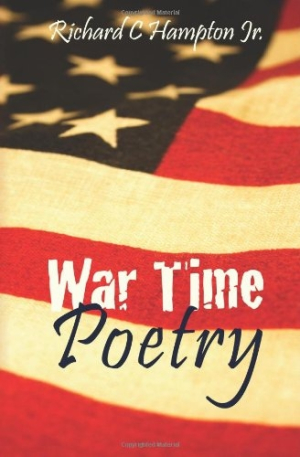War Time Poetry
Richard C. Hampton served as a Navy corpsman for over twenty-one years and was decorated for heroism during Operation Iraqi Freedom. He is one of the courageous Americans who has seen the horrors of war and learned to heal from the traumatic experience. Hampton’s book, War Time Poetry, is a compilation of bold and honest poems about the trials of reintegration after experiencing the physical and emotional wounds of battle.
Hampton’s poems are not esoteric or overly fancified. The cleanly cut, colloquial lines pull from Hampton’s experience. Occasionally readers will notice slightly tepid language such as, “I’ll be gone for up to a year / Missing your warm embrace / Now don’t you go and shed a tear / Because your love I can’t replace.” When the poems pull away from this kind of expected language and dig into a more visceral reality, they make a real impact.
For the most part, the rhyming in the poems borders on prosaic. Contrary to this, the poem “Loss of Control” feels very alive because of the immediacy of the rhyme. In the lines, “The noises are confusing / My emotions are abusing / Tensions build within / I’m coming out of my skin / I wish I was calm / But I feel like a bomb / Ready to explode at any minute / Can I out run the fear within it?” the driving rhythm creates an engaging scene.
What the poems lack in creative language they make up for with their sincerity. Several of the untitled shorter pieces are quite poignant in their brevity and call to mind sharp nails being driven into a board. They are stark, to the point, and binding. One of them describes the internal pain of witnessing bloodshed: “Wounds / Personal, painful / Disfiguring traumatizing, piercing / An eternal reminder of war / Torment.” Another example seems to have found the solution to all suffering: “Happiness and hope / The keys to tranquility / Contribute to peace on earth.”
As Hampton states in the preface, “These writings also provide examples of how people that have participated in arduous conditions whether on the battlefield or the home front can ask for help in order to improve their daily lives.” He continues, “It takes courage for someone to ask for help, especially for mental health conditions such as Post Traumatic Stress Disorder (PTSD).”
Hampton has exhibited distinctive courage by writing this restorative and cathartic book. By sharing his first-person account of his time overseas, he has opened up an important literary dialogue that could be exceptionally healing for those who are suffering from the aftereffects of war.
Reviewed by
Colby Cedar Smith
Disclosure: This article is not an endorsement, but a review. The publisher of this book provided free copies of the book and paid a small fee to have their book reviewed by a professional reviewer. Foreword Reviews and Clarion Reviews make no guarantee that the publisher will receive a positive review. Foreword Magazine, Inc. is disclosing this in accordance with the Federal Trade Commission’s 16 CFR, Part 255.

